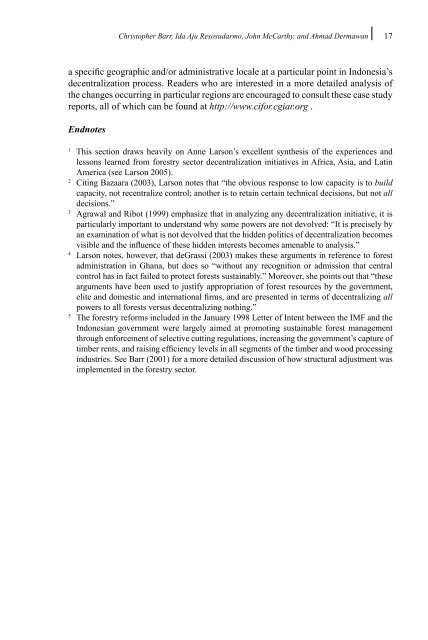Decentralization of Forest Administration in Indonesia, Implications ...
Decentralization of Forest Administration in Indonesia, Implications ...
Decentralization of Forest Administration in Indonesia, Implications ...
Create successful ePaper yourself
Turn your PDF publications into a flip-book with our unique Google optimized e-Paper software.
Christopher Barr, Ida Aju Resosudarmo, John McCarthy, and Ahmad Dermawan 17<br />
a specific geographic and/or adm<strong>in</strong>istrative locale at a particular po<strong>in</strong>t <strong>in</strong> <strong>Indonesia</strong>’s<br />
decentralization process. Readers who are <strong>in</strong>terested <strong>in</strong> a more detailed analysis <strong>of</strong><br />
the changes occurr<strong>in</strong>g <strong>in</strong> particular regions are encouraged to consult these case study<br />
reports, all <strong>of</strong> which can be found at http://www.cifor.cgiar.org .<br />
Endnotes<br />
1<br />
This section draws heavily on Anne Larson’s excellent synthesis <strong>of</strong> the experiences and<br />
lessons learned from forestry sector decentralization <strong>in</strong>itiatives <strong>in</strong> Africa, Asia, and Lat<strong>in</strong><br />
America (see Larson 2005).<br />
2<br />
Cit<strong>in</strong>g Bazaara (2003), Larson notes that “the obvious response to low capacity is to build<br />
capacity, not recentralize control; another is to reta<strong>in</strong> certa<strong>in</strong> technical decisions, but not all<br />
decisions.”<br />
3<br />
Agrawal and Ribot (1999) emphasize that <strong>in</strong> analyz<strong>in</strong>g any decentralization <strong>in</strong>itiative, it is<br />
particularly important to understand why some powers are not devolved: “It is precisely by<br />
an exam<strong>in</strong>ation <strong>of</strong> what is not devolved that the hidden politics <strong>of</strong> decentralization becomes<br />
visible and the <strong>in</strong>fluence <strong>of</strong> these hidden <strong>in</strong>terests becomes amenable to analysis.”<br />
4<br />
Larson notes, however, that deGrassi (2003) makes these arguments <strong>in</strong> reference to forest<br />
adm<strong>in</strong>istration <strong>in</strong> Ghana, but does so “without any recognition or admission that central<br />
control has <strong>in</strong> fact failed to protect forests susta<strong>in</strong>ably.” Moreover, she po<strong>in</strong>ts out that “these<br />
arguments have been used to justify appropriation <strong>of</strong> forest resources by the government,<br />
elite and domestic and <strong>in</strong>ternational firms, and are presented <strong>in</strong> terms <strong>of</strong> decentraliz<strong>in</strong>g all<br />
powers to all forests versus decentraliz<strong>in</strong>g noth<strong>in</strong>g.”<br />
5<br />
The forestry reforms <strong>in</strong>cluded <strong>in</strong> the January 1998 Letter <strong>of</strong> Intent between the IMF and the<br />
<strong>Indonesia</strong>n government were largely aimed at promot<strong>in</strong>g susta<strong>in</strong>able forest management<br />
through enforcement <strong>of</strong> selective cutt<strong>in</strong>g regulations, <strong>in</strong>creas<strong>in</strong>g the government’s capture <strong>of</strong><br />
timber rents, and rais<strong>in</strong>g efficiency levels <strong>in</strong> all segments <strong>of</strong> the timber and wood process<strong>in</strong>g<br />
<strong>in</strong>dustries. See Barr (2001) for a more detailed discussion <strong>of</strong> how structural adjustment was<br />
implemented <strong>in</strong> the forestry sector.

















